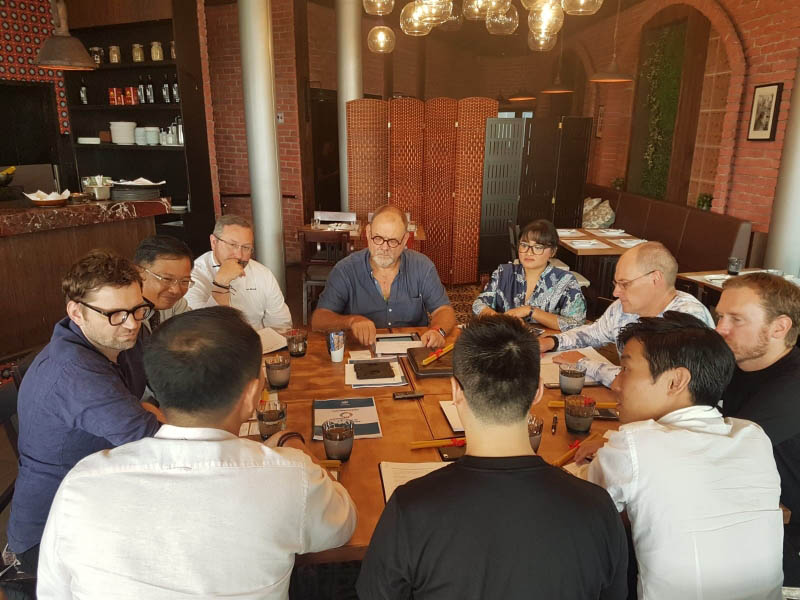To A Sustainable Future
by Reuben Oh
@ 05 Oct 2018

Yesterday, we gathered some of the key members of the F&B industry to talk about one of the most pertinent topics of the day: sustainability in Singapore. In the meeting sat Mr. Peter Knipp, Principal of Peter Knipp Holdings; Mr. Kannan Chandran, owner of E-Quill Media; Mr. Jeffrey Soh, Managing Director of Fabristeel; Chef Robert Stirrup, Director of Culinary Operations at Fairmont Singapore & Swissotel The Stamford; Mr. Ken Kuwako, General Manager of Salt Grill & Sky Bar; Mr Zoran Svetlicic of Adriatic Pantry; Mr. Roderic Proniewski, Director of Asia Wine Network; Mr. Kenny Eng, President of Kranji Countryside Association; Mr. Karl Higgins, Restaurant Manager of Salt Grill & Sky Bar; and Chef Ken Deng, Head Chef of Salt Tapas & Bar. The main talking point of this meeting was on the state of sustainability in Singapore: what are we doing now to address it, what are the flaws in our processes, and how do we go forward from here?
Looking to a growing trend globally, Mr. Svetlivic and Mr. Kuwako brought up how the current mode of food supply – importing and exporting from overseas – has a great impact on the environment: firstly, its great contribution to carbon emissions, and secondly, its extensive use of packaging. The issue has to be tackled before it takes too much of a drain on global resources. Mr. Knipp further used Noma, the Danish restaurant ubiquitous with the sustainable New Nordic scene, as an example, citing their use of local produce as a key inspiration. Furthermore, Chef Ken gave an example of how he is reducing wastage in his own kitchen, utilising all parts of an animal/produce in his menu.
Moving on, Mr. Proniewski stated that sustainability first and foremost has to be viable for business for it to have a universal appeal. He made a point that business owners nowadays see sustainability as a way to milk money from consumers: attracting the younger generation who are generally more socially conscious. A more direct approach, he proposes, would be to educate people from the ground-up, practicing sustainability within their daily routines, in the homes and kitchens they live and cook in regularly.
In consideration of the foodservice industry, Mr. Soh put forward that F&B companies are continuing to take a more reactive approach: reviewing their operations, equipment and processes for their sustainability whilst maintaining cost-efficiency. His mission statement would be to provide sustainable equipment that is more cost efficient to the customer.
For Mr. Higgins, the younger generation is key to a sustainable future, considering that many else have appeared to stop caring about the subject. Mr. Eng agreed, further expanding on the point by saying that the next generation of Singaporeans have to be encouraged to participate in the agriculture industry. Only when chefs and farmers come together, can the discussion of change become a reality. Chef Stirrup agreed with Mr. Higgins that the younger generation are more conscious of sustainability, and that relevant efforts evolve over time. To cap off the topic, Mr. Chandran reinforced that this challenge is inherently in the mind-set, and that realistically people are driven by many other factors when it comes to consumption. To him, if the sustainable option can be made cost comparable to mass produced products, then people – including the young – can begin considering making a change.
Taking this into account, Cuisine & Wine Asia, along with its sister event the World Gourmet Summit, will be taking the topic of sustainability to the main stage in next year’s event. Expect a facelift of the Summit, with a continued discussion on how to take Singapore forward in the path towards an environmentally conscious society. Wakening the industry to the importance of changing its processes will take centre-stage, and of course, a continuation of bringing to you some of the best gastronomical experiences this country has to offer.
 Yesterday, we gathered some of the key members of the F&B industry to talk about one of the most pertinent topics of the day: sustainability in Singapore. In the meeting sat Mr. Peter Knipp, Principal of Peter Knipp Holdings; Mr. Kannan Chandran, owner of E-Quill Media; Mr. Jeffrey Soh, Managing Director of Fabristeel; Chef Robert Stirrup, Director of Culinary Operations at Fairmont Singapore & Swissotel The Stamford; Mr. Ken Kuwako, General Manager of Salt Grill & Sky Bar; Mr Zoran Svetlicic of Adriatic Pantry; Mr. Roderic Proniewski, Director of Asia Wine Network; Mr. Kenny Eng, President of Kranji Countryside Association; Mr. Karl Higgins, Restaurant Manager of Salt Grill & Sky Bar; and Chef Ken Deng, Head Chef of Salt Tapas & Bar. The main talking point of this meeting was on the state of sustainability in Singapore: what are we doing now to address it, what are the flaws in our processes, and how do we go forward from here?
Yesterday, we gathered some of the key members of the F&B industry to talk about one of the most pertinent topics of the day: sustainability in Singapore. In the meeting sat Mr. Peter Knipp, Principal of Peter Knipp Holdings; Mr. Kannan Chandran, owner of E-Quill Media; Mr. Jeffrey Soh, Managing Director of Fabristeel; Chef Robert Stirrup, Director of Culinary Operations at Fairmont Singapore & Swissotel The Stamford; Mr. Ken Kuwako, General Manager of Salt Grill & Sky Bar; Mr Zoran Svetlicic of Adriatic Pantry; Mr. Roderic Proniewski, Director of Asia Wine Network; Mr. Kenny Eng, President of Kranji Countryside Association; Mr. Karl Higgins, Restaurant Manager of Salt Grill & Sky Bar; and Chef Ken Deng, Head Chef of Salt Tapas & Bar. The main talking point of this meeting was on the state of sustainability in Singapore: what are we doing now to address it, what are the flaws in our processes, and how do we go forward from here?